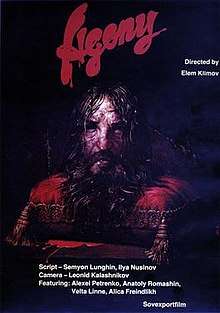Agony (1982 film)
Agony (Russian: Агония, romanized: Agoniya; U.S. theatrical/DVD title Rasputin) is a 1981 Soviet film by Elem Klimov, made c.1973-75 and released in Western and Central Europe in 1982 (United States and Soviet Union 1985), after protracted resistance from Soviet authorities. The film is notable for its rich, sometimes baroque style, its sumptuous recreation of episodes from the final year of Imperial Russia and the psychological portraits of Grigori Rasputin and the Imperial family.
| Agony | |
|---|---|
 Theatrical release poster | |
| Directed by | Elem Klimov |
| Produced by | Elem Klimov |
| Written by | Semyon Lungin Ilya Nusinov |
| Starring | Aleksei Petrenko Alisa Freindlich Velta Līne Anatoli Romashin |
| Music by | Alfred Schnittke |
| Cinematography | Leonid Kalashnikov |
| Edited by | Valeria Belova |
Production company | |
| Distributed by | Ruscico, Russia (current); Kino International (dvd, North America) |
Release date | 1982 Venice Film Festival 1982 Czechoslovakia, Hungary, Poland 1983 Sweden, Great Britain, France 1985 Soviet Union, United States |
Running time | 151 minutes (international release 1982) |
| Country | Soviet Union |
| Language | Russian |
Synopsis
The storyline of the film follows the final months of 1916 up to the murder of Rasputin; some events have been telescoped into this time though they actually happened earlier, during the war. Rasputin's effect on people around him is shown as almost hypnotic, and the film avoids taking a moral stance towards him—breaking not only with Soviet history but also with how he was regarded by people near the court at the time, some of whom regarded him as a debilitating figure who disgraced the monarchy and hampered the war effort.[1]
Cast
- Aleksei Petrenko as Grigori Rasputin
- Anatoli Romashin as emperor Nicholas II
- Velta Līne as empress Alexandra Feodorovna
- Alisa Freindlich as Anna Vyrubova
- Aleksandr Romantsov as Felix Yusupov
- Yuri Katin-Yartsev as Vladimir Purishkevich
- Leonid Bronevoy as Ivan Manasevich-Manuilov
- Pavel Pankov as Manus
- Mickhail Danilov as Mikhail M. Andronikov
- Mikhail Svetin as Terekhov
- Boris Romanov as Balashov
- Lyudmila Polyakova as Praskovya Fyodorovna, Rasputin's wife
- Afanasi Trishkin as Maklakov
Production
As evidenced by the scenography and photography, the resources for the film appear to have been lavish, but once finished the film was declared unsuitable for release; the reasons were evidently to do with the way the imperial family is portrayed.[2] In this film Nicholas II is shown as weak and indecisive rather than brutal, and this did not square with the way the period had been retold in Soviet historiography and schoolbooks.[3] Furthermore, the Bolsheviks make no appearance at all in the film, though it takes place during the final months of the empire, when the state was drifting toward revolution. This is historically truthful; the Bolsheviks had a very low level of activity in Russia during the First World War, as most of their leaders were abroad or in prison and at the time they made no real, organized contribution to the unrest until after Lenin had returned in April 1917, by which time the Tsar had already been deposed. This was something Soviet history would not recognize; instead Lenin would be portrayed as the wise general of the upheaval from the start, and the Bolsheviks as the mass party of the working classes. Finally, the prominence of sexuality and sectarian religion in the film were hard to stomach for Soviet censors.[4][5]
Release
The film went unshown until 1981, when it was screened at the Moscow Film Festival and attracted very favourable reviews. Released in Western Europe, Czechoslovakia,[6][7] Hungary,[8] Poland[9][10] in 1982, it was hailed as one of the most original Soviet films of the 1970s. It was screened later in 1985, at the dawn of the Glasnost era. The versions released in the 1980s, and later on DVD, differ somewhat in length and the final voice-over newsreel shots of the 1917 revolution may have been added in to appease Soviet authorities.[11] The original mid-1970s cut does not seem to have survived, and it is unclear how much was rewritten or possibly reshot after 1975.
References
- "«Агония» двух империй. «Новая газета» N2, 15.01.2004". Archived from the original on 2016-03-04. Retrieved 2016-03-03.
- О.Платонов. Жизнь за Царя (Правда о Григории Распутине)
- В. А. Жуковская. Мои воспоминания о Григории Ефимовиче Распутине 1914—1916 гг.
- The Real Tsaritsa by Lily Dehn.
- Рассулин Ю. Ю. Верная Богу, Царю и Отечеству. — Saint-Petersburg: Царское Дело, 2005.
- anderson (2011-08-10). "Agónie - konec Rasputina". Film (in Czech and Slovak). Česko-Slovenská filmová databáze.
- Vlach, Zdeněk (2010-01-09). "Agónie konec Rasputina". Plakát (in Czech). Antikvariát Dana Kurovce. Archived from the original on 2012-05-01.
- Spiró, György (1982-12-01). "Remekmű a léten túlról (Agónia)". Filmvilág. 1982 (12): 10–13.
- Dipont, Małgorzata (1982-05-09). "Agonia". Film (in Polish). RSW Prasa-Książka- Ruch. 7/1714: 14. ISSN 0137-463X.
- Schonborn, Jerzy (1982). "Randez-vous z Griszką Rasputinem". Film (in Polish). RSW Prasa-Książka- Ruch. 1982 (23): 6. ISSN 0137-463X.
- http://www.eutorrents.com/drama/2010/agony-1981.html